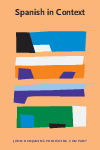
Spanish in Context
Scope & Guideline
Navigating the Depths of Spanish Contextual Studies
Introduction
Aims and Scopes
- Sociolinguistic Variation and Change:
The journal emphasizes the study of sociolinguistic variation, examining how language use changes across different communities and contexts, particularly in relation to regional varieties of Spanish. - Language Contact and Bilingualism:
Research on language contact phenomena, including code-switching and language mixing, particularly in bilingual contexts, is a core focus, reflecting the complexities of Spanish in multilingual settings. - Pragmatics and Discourse Analysis:
In-depth studies of discourse markers, politeness strategies, and pragmatic functions of language in various contexts are prevalent, showcasing the journal's interest in the interactional aspects of language use. - Language and Identity:
The exploration of how language shapes and reflects identities, particularly among youth and marginalized groups, is a recurring theme, highlighting the socio-cultural dimensions of language. - Cognitive and Theoretical Linguistics:
The journal also addresses cognitive aspects of language use and theoretical frameworks, providing insights into the mental processes underlying language acquisition and usage.
Trending and Emerging
- Youth Language and Subcultures:
There is a growing focus on the language of youth cultures, including the impact of countercultural movements and digital communication on linguistic practices, reflecting the importance of understanding youth identity in linguistic studies. - Digital Communication and Language Change:
Research exploring the effects of digital media on language use, including code-switching and the emergence of new linguistic forms, is increasingly prominent, highlighting the influence of technology on contemporary Spanish. - Inclusive Language and Gender Issues:
Emerging discussions around inclusive language practices and the sociopolitical implications of gendered language are gaining traction, indicating a shift towards addressing social justice in language use. - Language and Mental Health:
The intersection of language and mental health, particularly in medical discourse and its implications for social equity, is an increasingly relevant theme, reflecting broader societal concerns.
Declining or Waning
- Traditional Dialectology:
While dialectological studies remain important, there has been a noticeable decline in traditional dialectology approaches, with fewer papers focusing solely on historical dialectal variations without sociolinguistic context. - Formal Linguistic Analysis:
Research that primarily emphasizes formal linguistic structures, such as syntax and morphology, without integrating sociocultural contexts has become less frequent, reflecting a broader trend towards more applied and contextually grounded studies. - Static Language Models:
There is a waning interest in static models of language that do not account for dynamic changes and variations over time, as researchers increasingly focus on the fluid nature of language in contemporary contexts.
Similar Journals
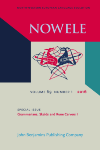
NOWELE-North-Western European Language Evolution
Connecting Scholars Through Language ResearchNOWELE-North-Western European Language Evolution, published by John Benjamins Publishing Co, serves as a vital platform for researchers and scholars interested in the evolution and dynamics of North-Western European languages. With an ISSN of 0108-8416 and an E-ISSN of 2212-9715, this journal has been contributing to the field of linguistics since its inception in 1983, with ongoing publications until 2024. Indexed in Scopus and classified in the Q3 category for Linguistics and Language, NOWELE is recognized for its rigorous academic standards and diverse contributions, ranking #485 out of 1088 in the Arts and Humanities category, and #566 out of 1167 in Social Sciences. The journal fosters an open dialogue within the linguistic community, presenting innovative research findings and theoretical advancements. Researchers, professionals, and students alike benefit from its systematic exploration of language evolution in the context of a rapidly changing global linguistic landscape.

Anuari de Filologia-Estudis de Linguistica
Exploring the intricate dynamics of language and philology.Anuari de Filologia-Estudis de Lingüística is a prominent open-access journal published by the University of Barcelona, dedicated to advancing the study of linguistics and philology. Since its establishment, the journal has become a vital platform for scholars and researchers interested in the intricate dynamics of language, embracing various linguistic fields and methodologies. With its Open Access model initiated in 2011, Anuari de Filologia ensures that cutting-edge research is accessible to a global audience, bridging gaps in knowledge and fostering collaboration. The journal’s commitment to excellence is reflected in its rigorous peer-review process and engagement with contemporary linguistic issues. This makes it an essential resource for academics, professionals, and students aiming to deepen their understanding of linguistic theories and practices in an increasingly interconnected world.
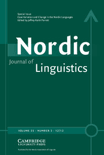
Nordic Journal of Linguistics
Elevating academic standards in language research.Nordic Journal of Linguistics, published by Cambridge University Press, serves as a prominent platform for the dissemination of cutting-edge research in the field of linguistics. Established in 1978 and spanning over four decades, the journal has curated a rich repository of scholarly work that reflects the dynamic and evolving nature of language studies. With an impressive Q2 ranking in both the Linguistics and Language category and a commendable performance in Scopus rankings, placing it at the 74th percentile among Arts and Humanities, the journal is recognized for its high academic standards and impact on contemporary linguistic research. Scholars and practitioners can access a variety of studies that delve into different languages, linguistic theories, and methodologies, fostering broader understanding and dialogue within the linguistic community. Although the journal does not currently offer open-access options, it remains an invaluable resource for researchers, professionals, and students keen on advancing their knowledge of language and linguistics.
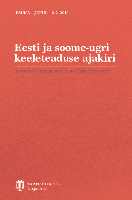
Eesti ja Soome-Ugri Keeleteaduse Ajakiri-Journal of Estonian and Finno-Ugric Linguistics
Championing Open Access to Linguistic DiscoveriesEesti ja Soome-Ugri Keeleteaduse Ajakiri - Journal of Estonian and Finno-Ugric Linguistics is a premier academic journal published by UNIV TARTU PRESS, dedicated to advancing the field of linguistics with a particular focus on the Estonian and Finno-Ugric languages. Since its inception, the journal has embraced an Open Access publishing model, allowing researchers and enthusiasts to freely explore its groundbreaking studies and findings since 2013. With an Impact Factor that places it in the Q3 quartile of leading journals within the linguistic domain, it serves as a vital platform for the dissemination of new research and theoretical advancements. Ranked 410th out of 1088 journals in the Arts and Humanities category for Language and Linguistics, it reflects a robust commitment to quality scholarship that appeals to academics, professionals, and students alike. Operating from Tartu, Estonia, the journal aims to foster greater understanding and appreciation of the Estonian language within the broader context of Finno-Ugric studies, making it an essential resource for anyone interested in these unique linguistic cultures.
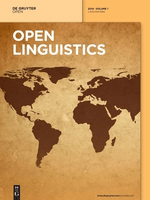
Open Linguistics
Innovating discourse in linguistics for a global audience.Open Linguistics is a premier open access journal dedicated to advancing the field of linguistics, published by DE GRUYTER POLAND SP Z O O. Since its inception in 2014, the journal has consistently provided a platform for innovative research and critical discourse in various subfields of linguistics. With an impressive Q1 ranking in the linguistics category as of 2023, Open Linguistics is recognized for its significant contributions, ranking #223 out of 1088 in Arts and Humanities, as well as achieving a commendable #260 out of 1167 in Social Sciences. The journal's open access policy ensures that research is freely accessible to both scholars and practitioners, fostering a collaborative and inclusive academic community. With a focus on original research, reviews, and theoretical papers, Open Linguistics is positioned as an essential resource for researchers, educators, and students seeking to deepen their understanding of language and its diverse applications in society.

Cadernos de Estudos Linguisticos
Connecting scholars and ideas in the world of linguistics.Cadernos de Estudos Linguisticos, published by UNIV ESTADUAL CAMPINAS, INST ESTUDOS LINGUAGEM, stands as a pivotal platform in the field of linguistic studies since its inception in 1978. With its commitment to Open Access, this journal fosters the dissemination of cutting-edge research, ensuring that knowledge is accessible to a global audience. This also enhances collaboration among researchers, professionals, and students dedicated to exploring the nuances of language. The journal proudly carries the ISSN 0102-5767 and E-ISSN 2447-0686, attesting to its uninterrupted quality and relevance in linguistic scholarship. By addressing various facets of language studies, including syntax, semantics, and sociolinguistics, this esteemed journal is a vital resource for advancing understanding and innovation in the field.
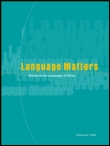
Language Matters
Elevating Research in Linguistics and CommunicationLanguage Matters is a prestigious journal dedicated to the dynamic field of Linguistics and Language, published by Routledge Journals, Taylor & Francis Ltd in the United Kingdom. With an ISSN of 1022-8195 and an E-ISSN of 1753-5395, this journal serves as an essential platform for scholars seeking to explore the multifaceted relationships between language and society. Recognized in the 2023 Category Quartiles as Q2 in Linguistics and Language, it boasts impressive Scopus rankings, sitting at #298 out of 1088 in the Arts and Humanities category and #356 out of 1167 in Social Sciences, highlighting its significant impact on the field with a 72nd and 69th percentile ranking, respectively. The journal's scope encompasses a wide range of topics including language acquisition, sociolinguistics, and psycholinguistics, making it a vital resource for researchers, educators, and students alike. By not offering open access, it maintains a curated selection of high-quality peer-reviewed articles, ensuring that academic rigor and relevance are upheld for its readership. With a publication range spanning from 1993 to 2024, Language Matters continues to shape conversations and advance knowledge in the ever-evolving landscape of linguistic research.
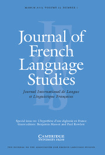
Journal of French Language Studies
Fostering Academic Excellence in French Language StudiesJournal of French Language Studies, published by Cambridge University Press, is a prestigious and leading journal in the field of linguistics and language that provides a platform for scholarly articles and research findings relevant to the French language and its various dimensions. With an impressive Q1 ranking in the 2023 categorization and ranked #257 out of 1088 in Scopus for Language and Linguistics, this journal plays a pivotal role in advancing the study of French linguistic methodologies, sociolinguistics, and applied linguistics. Since its inception in 1991, the journal has continually contributed to the academic community, attracting innovative investigations and theoretical discussions that enrich understanding and research in the field. Researchers and students enjoy comprehensive access to critical analysis and emerging trends, and as it continues to converge towards 2024, the journal promises to remain an essential resource for exploring the evolving landscape of French language studies.
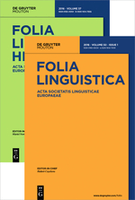
FOLIA LINGUISTICA
Innovating Insights in Linguistics and LanguageFOLIA LINGUISTICA, published by WALTER DE GRUYTER GMBH, is a premier scholarly journal dedicated to the field of linguistics. Established in 1967, the journal has consistently provided a platform for innovative research and scholarly discourse in language and linguistics, contributing significantly to the academic community's understanding of language structures, usage, and cognitive processes. With its classification in the top quartile (Q1) of linguistics and language in 2023, FOLIA LINGUISTICA holds a respectable rank (#282/1088) within the Arts and Humanities category and an admirable percentile rank of 74th, ensuring its position at the forefront of linguistic scholarship. Researchers and academics from around the globe can access a wealth of knowledge and cutting-edge research findings through this esteemed publication, which is vital for anyone looking to engage with the latest advancements in linguistics. Located in Berlin, Germany, FOLIA LINGUISTICA encompasses all aspects of language research, making it an indispensable resource for researchers, professionals, and students alike seeking to deepen their understanding of language and its complexities.

Turkic Languages
Navigating the Intricacies of Turkic Language StudiesTurkic Languages is an esteemed academic journal published by HARRASSOWITZ VERLAG, dedicated to the exploration and analysis of Turkic languages within the broader fields of linguistics and language studies. With an ISSN of 1431-4983, this journal serves as a vital platform for researchers, professionals, and students interested in the intricate structures, dynamics, and cultural contexts of Turkic languages. Although it currently operates without an Open Access option, the journal's commitment to quality research is evident in its placement within the Q4 category of Linguistics and Language for 2023, alongside its Scopus rankings where it stands in the 30th and 26th percentiles for Language and Linguistics across Arts and Humanities and Social Sciences, respectively. The journal's scope encompasses a variety of linguistic phenomena, striving to foster a deeper understanding of Turkic languages and their significance in the global linguistic landscape. With converged years from 2017 to 2022, Turkic Languages continues to uphold its reputation as a crucial resource for advancing scholarship in this specialized field.